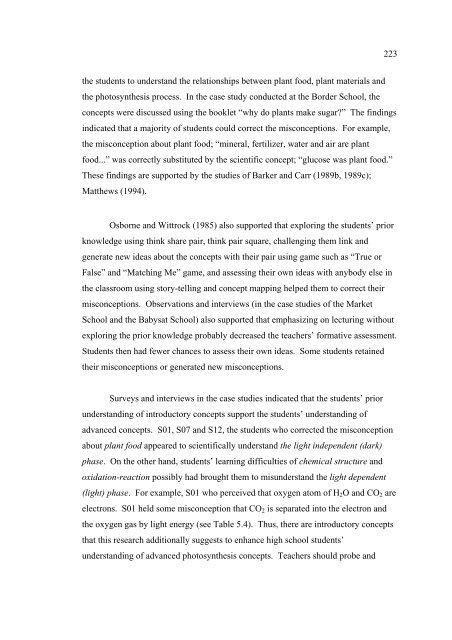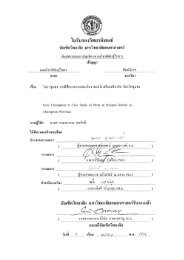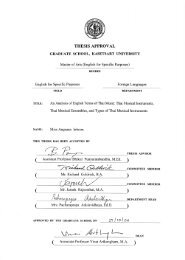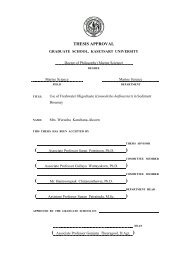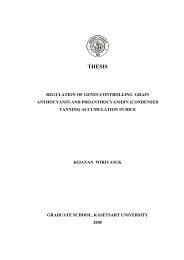an innovative approach
an innovative approach
an innovative approach
Create successful ePaper yourself
Turn your PDF publications into a flip-book with our unique Google optimized e-Paper software.
the students to underst<strong>an</strong>d the relationships between pl<strong>an</strong>t food, pl<strong>an</strong>t materials <strong>an</strong>d<br />
223<br />
the photosynthesis process. In the case study conducted at the Border School, the<br />
concepts were discussed using the booklet “why do pl<strong>an</strong>ts make sugar?” The findings<br />
indicated that a majority of students could correct the misconceptions. For example,<br />
the misconception about pl<strong>an</strong>t food; “mineral, fertilizer, water <strong>an</strong>d air are pl<strong>an</strong>t<br />
food...” was correctly substituted by the scientific concept; “glucose was pl<strong>an</strong>t food.”<br />
These findings are supported by the studies of Barker <strong>an</strong>d Carr (1989b, 1989c);<br />
Matthews (1994).<br />
Osborne <strong>an</strong>d Wittrock (1985) also supported that exploring the students’ prior<br />
knowledge using think share pair, think pair square, challenging them link <strong>an</strong>d<br />
generate new ideas about the concepts with their pair using game such as “True or<br />
False” <strong>an</strong>d “Matching Me” game, <strong>an</strong>d assessing their own ideas with <strong>an</strong>ybody else in<br />
the classroom using story-telling <strong>an</strong>d concept mapping helped them to correct their<br />
misconceptions. Observations <strong>an</strong>d interviews (in the case studies of the Market<br />
School <strong>an</strong>d the Babysat School) also supported that emphasizing on lecturing without<br />
exploring the prior knowledge probably decreased the teachers’ formative assessment.<br />
Students then had fewer ch<strong>an</strong>ces to assess their own ideas. Some students retained<br />
their misconceptions or generated new misconceptions.<br />
Surveys <strong>an</strong>d interviews in the case studies indicated that the students’ prior<br />
underst<strong>an</strong>ding of introductory concepts support the students’ underst<strong>an</strong>ding of<br />
adv<strong>an</strong>ced concepts. S01, S07 <strong>an</strong>d S12, the students who corrected the misconception<br />
about pl<strong>an</strong>t food appeared to scientifically underst<strong>an</strong>d the light independent (dark)<br />
phase. On the other h<strong>an</strong>d, students’ learning difficulties of chemical structure <strong>an</strong>d<br />
oxidation-reaction possibly had brought them to misunderst<strong>an</strong>d the light dependent<br />
(light) phase. For example, S01 who perceived that oxygen atom of H2O <strong>an</strong>d CO2 are<br />
electrons. S01 held some misconception that CO2 is separated into the electron <strong>an</strong>d<br />
the oxygen gas by light energy (see Table 5.4). Thus, there are introductory concepts<br />
that this research additionally suggests to enh<strong>an</strong>ce high school students’<br />
underst<strong>an</strong>ding of adv<strong>an</strong>ced photosynthesis concepts. Teachers should probe <strong>an</strong>d


